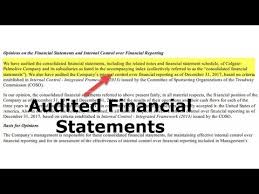Certified Audited Financial Statements
Certified Audited Financial Statements audited by an independent CPA. Financial statements that have been prepared in accordance with generally accepted accounting principles (GAAP) and generally accepted auditing standards (GAAS). (This article explains what an audit is, but we do not provide any attestation services.)
Certified Audited Financial Statements are performed by a CPA, or more accurately, an audit of financial statements, is the review of the financial statements of a company or any other legal entity (including governments), resulting in the publication of an independent opinion on whether or not those financial statements are relevant, accurate, complete, and fairly presented. Financial audits are typically performed by CPA firms due to the specialist financial reporting knowledge they require. Audited financial statements are one of many assurances or attestation functions provided by CPA firms, whereby the CPA firm provides an independent opinion on the published information. Many organizations separately employ or hire internal auditors, who do not attest to financial reports but focus mainly on the internal controls of the organization. External auditors may choose to place limited reliance on the work of internal auditors.
Purpose of Certified Audited Financial Statements
Audited financial statements exist to add credibility to the implied assertion by an organization’s management that its financial statements fairly represent the organization’s position and performance to the firm’s stakeholders (interested parties). The principal stakeholders of a company are typically its shareholders, but other parties such as tax authorities, banks, regulators, suppliers, customers, and employees may also have an interest in ensuring that the financial statements are accurate.
The CPA designs the audit to reduce the possibility that a material misstatement is not detected by audit procedures. A misstatement is defined as false or missing information, whether caused by fraud (including deliberate misstatement) or error. “Material” is very broadly defined as being large enough or important enough to cause stakeholders to alter their decisions.
Audited financial statements exist because they add value by easing the cost of information asymmetry, not because they are required by law. For example, a privately-held company that does not issue securities on a public exchange might engage a firm to audit its financial statements in order to obtain more desirable loan terms from a financial institution or trade accounts with its customers. Without the audit, the lending party would not have assurance as to whether or not the company’s financial position is accurate. In turn, the lender could price protect against this information asymmetry.
The exact form and content of the “audit opinion” will vary between countries, firms, and audited organizations.
In the US, the CPA firm provides written assurance that financial reports are “fairly presented in conformity with audited financial statements GAAP.” The measure for “fairly presented” is that there is less than 5% chance (5% audit risk) that the financial statements are “materially misstated.”
Audited Financial Statements
Welcome to the Gutenberg Editor
The goal of this new editor is to make adding rich content to WordPress simple and enjoyable. This whole post is composed of pieces of content—somewhat similar to LEGO bricks—that you can move around and interact with. Move your cursor around and you’ll notice the different blocks light up with outlines and arrows. Press the
How to Increase Profit Margins Through Virtual CFO Services
How to Increase Profit Margins Through Virtual CFO Services

Great Accounting Firms Share These 10 Traits
Great Accounting Firms Share These 10 Traits which has gone far beyond the paper-pushing days and now involves acting as a virtual CFO

Tax Accountant in Miami Cope with IRS Tax Season Delay
Tax Accountant said IRS delays start of tax season for individual returns would be postponed until February 17 with some as late as March

Miami Accountants Philosophy of Up or Out
Its up or out for Miami Accountants firms are faced with the dilemma of keeping long-term managers that are not ready to be equity partners or let them go.

Contadores en Miami Explican Auditorías del IRS
Contadores en Miami, Gustavo A Viera CPA, explica los pasos de una auditoría, desde la notificación de la auditoría hasta el cierre de la misma
Home » Accounting & Bookkeeping Services » Certified Audited Financial Statements

